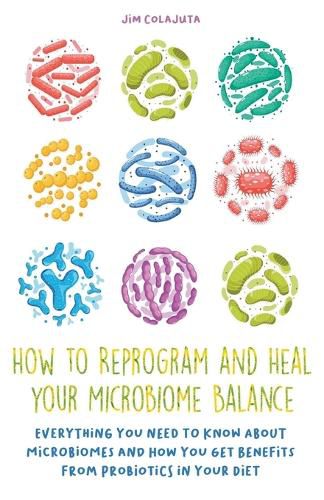Readings Newsletter
Become a Readings Member to make your shopping experience even easier.
Sign in or sign up for free!
You’re not far away from qualifying for FREE standard shipping within Australia
You’ve qualified for FREE standard shipping within Australia
The cart is loading…






This title is printed to order. This book may have been self-published. If so, we cannot guarantee the quality of the content. In the main most books will have gone through the editing process however some may not. We therefore suggest that you be aware of this before ordering this book. If in doubt check either the author or publisher’s details as we are unable to accept any returns unless they are faulty. Please contact us if you have any questions.
The microbiome consists of microbes that are both helpful and potentially harmful. Most are symbiotic (where both the human body and microbiota benefit), and some, in smaller numbers, are pathogenic (promoting disease). In a healthy body, pathogenic and symbiotic microbiota coexist without problems. But dysbiosis stops these normal interactions if there is a disturbance in that balance - brought on by infectious illnesses, certain diets, or the prolonged use of antibiotics or other bacteria-destroying medications. As a result, the body may become more susceptible to disease.
Microbiota stimulates the immune system, breaks down potentially toxic food compounds, and synthesizes certain vitamins. Amino acids, including the B vitamins and vitamin K. Sugars, are quickly absorbed in the upper part of the small intestine. Still, more complex carbohydrates like starches and fibers are not as easily digested and may travel lower to the large intestine. There, the microbiota help to break down these compounds with their digestive enzymes. The fermentation of indigestible fibers causes the production of short-chain fatty acids (SCFA) that can be used by the body as a nutrient source but also play an important role in muscle function and possibly the prevention of chronic diseases, including certain cancers and bowel disorders.
If microbiota is vital to our health, how can we ensure that we have enough of the right types? You may be familiar with probiotics or perhaps already using them. These foods naturally contain microbiota or supplement pills containing live active bacteria - advertised to promote digestive health.
In this book, you will learn about microbiome, probiotics' role of probiotics and how to rebalance them.
$9.00 standard shipping within Australia
FREE standard shipping within Australia for orders over $100.00
Express & International shipping calculated at checkout
This title is printed to order. This book may have been self-published. If so, we cannot guarantee the quality of the content. In the main most books will have gone through the editing process however some may not. We therefore suggest that you be aware of this before ordering this book. If in doubt check either the author or publisher’s details as we are unable to accept any returns unless they are faulty. Please contact us if you have any questions.
The microbiome consists of microbes that are both helpful and potentially harmful. Most are symbiotic (where both the human body and microbiota benefit), and some, in smaller numbers, are pathogenic (promoting disease). In a healthy body, pathogenic and symbiotic microbiota coexist without problems. But dysbiosis stops these normal interactions if there is a disturbance in that balance - brought on by infectious illnesses, certain diets, or the prolonged use of antibiotics or other bacteria-destroying medications. As a result, the body may become more susceptible to disease.
Microbiota stimulates the immune system, breaks down potentially toxic food compounds, and synthesizes certain vitamins. Amino acids, including the B vitamins and vitamin K. Sugars, are quickly absorbed in the upper part of the small intestine. Still, more complex carbohydrates like starches and fibers are not as easily digested and may travel lower to the large intestine. There, the microbiota help to break down these compounds with their digestive enzymes. The fermentation of indigestible fibers causes the production of short-chain fatty acids (SCFA) that can be used by the body as a nutrient source but also play an important role in muscle function and possibly the prevention of chronic diseases, including certain cancers and bowel disorders.
If microbiota is vital to our health, how can we ensure that we have enough of the right types? You may be familiar with probiotics or perhaps already using them. These foods naturally contain microbiota or supplement pills containing live active bacteria - advertised to promote digestive health.
In this book, you will learn about microbiome, probiotics' role of probiotics and how to rebalance them.